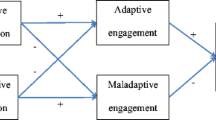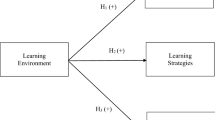Abstract
The purpose of this study is to understand predictors of different learning outcomes among various student background characteristics, types of learning motivation and engagement behaviors. 178 junior students were surveyed at a 4-year research university in Taiwan. The scales of motivation, engagement and perceived learning outcomes were adapted from the Motivated Strategies for Learning Questionnaire and the National Survey of Student Engagement College Student Report. Multiple hierarchical regression analysis was used in data analysis. Findings confirm that different student background characteristics and learning motivation can predict different learning outcomes. However, student engagement behaviors cannot significantly predict different types of learning outcomes when student background and learning motivation variables are included. This study also finds that student’s majors play an important role in explaining learning outcomes. Overall, the findings highlight the importance of learning motivation and suggest that instructors can provide students with more successful learning experiences to ensure more confidence in their learning abilities.
Similar content being viewed by others
References
Bollen, K. A. (1989). Structural equations with latent variables. New York: Wiley.
Bong, M. (1999). Role of self-efficacy and task-value in predicting college student’s course performance and future enrollment intentions. Paper presented at the 107th Annual Convention of the American Psychological Association. Boston, August 20–24.
Bruinsma, M. (2004). Motivation, cognitive processing and achievement in higher education. Learning and Instruction, 14(6), 549–568.
Dian-Fu, C., & Yeh, C. (2012). Teaching quality after the massification of higher education in Taiwan. Chinese Education & Society, 45(5/6), 31–44.
Eccles, J. S. (2005). Subjective task value and the Eccles et al model of achievement-related choices. In A. E. Elliot & C. Dweck (Eds.), Handbook of Competence Motivation (pp. 105–121). NY: Guilford.
Eccles, J. S., Adler, T. F., Futterman, R., et al. (1983). Achievement and achievement motives: Psychological and sociological approaches. In J. T. Spence (Ed.), Expectancies, values and academic behaviors (pp. 75–146). San Francisco: W. H. Freeman.
Eccles, J. S., & Wigfield, A. (2002). Motivation beliefs, values and goals. Annual Review of Psychology, 53, 109–132.
Fredricks, J. A., Blumenfeld, P. C., & Paris, A. H. (2004). School Engagement: Potential of the concept, state of the evidence. Review of Educational Research, 74(1), 59–109.
Gibson, A. M. (2008). Student demographic characteristics and student engagement at Texas 2-year institutions: A 3 year statewide study. PhD diss. Texas A&M University, Kingsville.
Hair, J. F., Black, B., Babin, B., Anderson, R. E., & Tatham, R. L. (2010). Multivariate data analysis: A global perspective. Upper Saddle River: Pearson Education.
Hsieh, P., Sullivan, J. R., & Guerra, N. S. (2007). A closer look at college students: Selfefficacy and goal orientation. Journal of Advanced Academics, 18(3), 454–476.
Huang, S. (2011). Predicting students’ academic performance in college using a new non-cognitive measure: An instrument design and a structural equation exploration of some non-cognitive attributes and academic performance. Dissertation, The Ohio State University, Columbus, Ohio.
Indiana University, national survey of student engagement (2010). Major differences: Examining student engagement by field of study. Annual results 2010. National Survey of Student Engagement.
Jessica, L. M. (2012). Honors and high-ability students: Factors that predict academic efficacy, critical thinking skills and academic goals. PhD diss. Iowa State University.
Kline, R. B. (2011). Convergence of structural equation modeling and multilevel modeling. In M. Williams, & W. P. Vogt (Eds.), Handbook of methodological innovation in social research methods (pp. 562–589). London: Sage
Korkmaz, A. (2007). Does student engagement matter to student success? PhD diss. Indiana University Bloomington.
Kuh, G. D., & Hu, S. (2001). The effects of student-faculty interaction in the 1990s. Review of Higher Education: Journal of the Association for the Study of Higher Education, 24(3), 309–332.
Lent, R. W., Brown, S. D., & Larkin, K. C. (1984). Relation of self-efficacy expectations to academic achievement and persistence. Journal of Counseling Psychology, 31(3), 356–362.
Lens, W., Simons, J., & Dewitte, S. (2001). Student motivation and self-regulation as a function of future time perspective and perceived instrumentality. In S. Volet, & S. Jarvela (Eds.), Motivation in learning contexts (pp. 233–248). New York: Pergamon
Maddox, R. S. (2010). An examination of classroom social environment on motivation and engagement of college early entrant honors students. PhD diss.University of Southern California.
Pascarella, E. T., & Terenzini, P. T. (2005). How college affects students. A third decade of research (Vol. 2). San Francisco: Jossey-Bass.
Pike, G. R., Smart, J. C., Kuh, G. D. (2005). Educational expenditures and student engagement: When does money matter? Annual Forum of the Association for Institutional Research (AIR). CA: San Diego.
Pintrich, P. R., Smith, D. A. F., Garcia, T., & McKeachie, W. J. (1991). A manual for the use of the Motivated Strategies for Learning Questionnaire (MSLQ). (Technical report no. 91-B-004). Ann Arbor, MI. University of Michigan.
Redman Mingo, V. A. (2010). The relationships among student characteristic variables, student engagement variables and the academic performance of African American malestudents at 2-year colleges. PhD diss. University of South Carolina.
Robbins, S., Lauver, K., Le, H., Davis, D., Langley, R., et al. (2004). Do psychosocial and study skill factors predict college outcomes? A meta-analysis. Psychological Bulletin, 130(2), 261–288.
Roebken, H. (2007). The influence of goal orientation on student satisfaction, academic engagement and achievement. Electronic Journal of Research in Educational Psychology, 5(3), 679–704.
Sansone, C., & Harackiewicz, J. M. (Eds.). (2000). Intrinsic and extrinsic motivation: The search for optimal motivation and performance. San Diego: Academic Press.
Schroeder, M. (1990). Diagnosing and dealing with multicollinearity. Western Journal of Nursing Research, 12(2), 175–184.
Shinde, G. S. (2008). The relationship between student’s responses on the National Survey of Student Engagement (NSSE) and retention. PhD diss. Tennessee Technological University.
Vansteenkiste, M., Simons, J., Lens, W., Sheldon, K. M., & Deci, E. L. (2004). Motivating learning, performance and persistence: The synergistic effects of intrinsic goal contents and autonomy-supportive contexts. Journal of Personality and Social Psychology, 87, 246–260.
Warmack, D. J. (2011). Comparison of satisfaction levels of minority and non-minority students in higher education based on levels of student engagement. PhD diss. Union University.
Waters, K. M. (2008). Factors that contribute to the engagement of African American students at a Catholic University. PhD diss. Wayne State University.
Wigfield, A., & Eccles, J. S. (2000). Expectancy-value theory of achievement motivation. Contemporary Educational Psychology, 25, 68–81.
Wigfield, A., Byrnes, J. P., & Eccles, J. S. (2006). Development during early and middle adolescence. In P. Alexander, & P. Winne (Eds.), Handbook of educational psychology (2nd Ed.). New York: Macmillan Publishing.
Author information
Authors and Affiliations
Corresponding author
Rights and permissions
About this article
Cite this article
Hsieh, TL. Motivation matters? The relationship among different types of learning motivation, engagement behaviors and learning outcomes of undergraduate students in Taiwan. High Educ 68, 417–433 (2014). https://doi.org/10.1007/s10734-014-9720-6
Published:
Issue Date:
DOI: https://doi.org/10.1007/s10734-014-9720-6




